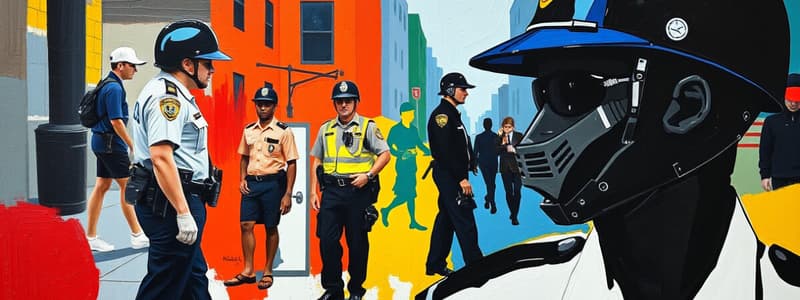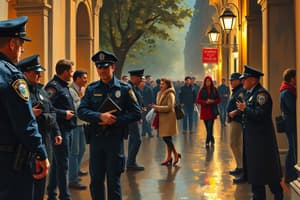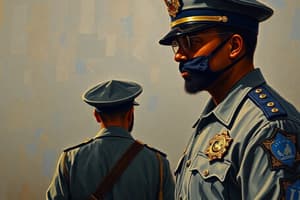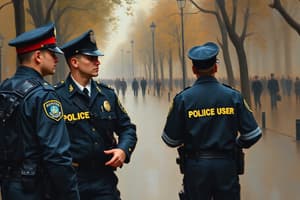Podcast
Questions and Answers
What concern is raised regarding policing in relation to protests and violence?
What concern is raised regarding policing in relation to protests and violence?
- Ineffective communication with the public.
- Increased use of technology during protests.
- Enhanced training programs for officers.
- Police responses being perceived as disproportionate. (correct)
What societal issue is highlighted as exacerbated by political rhetoric?
What societal issue is highlighted as exacerbated by political rhetoric?
- Increased violence in protests.
- Improved community relations.
- Stronger support for minority groups.
- Division and resentment in communities. (correct)
What is criticized regarding evolving societal norms?
What is criticized regarding evolving societal norms?
- Unwritten rules dictating acceptable language. (correct)
- Heightened political engagement.
- Increased freedom of speech.
- More inclusive discussions on sensitive topics.
How does the speaker suggest public discourse can improve?
How does the speaker suggest public discourse can improve?
What is implied to be a consequence of the current societal pressures?
What is implied to be a consequence of the current societal pressures?
What significant event is described as affecting political candidates during a campaign?
What significant event is described as affecting political candidates during a campaign?
What role do media platforms play according to the content?
What role do media platforms play according to the content?
What is one of the calls for change concerning authorities and public safety?
What is one of the calls for change concerning authorities and public safety?
Flashcards
Two-tier policing
Two-tier policing
Unequal treatment by police based on the nature of the situation, such as protests or violence.
Societal division
Societal division
Increased conflict and discord between groups in society.
Political rhetoric
Political rhetoric
Language used in political campaigns or discussions to influence public opinion.
Excessive force
Excessive force
Signup and view all the flashcards
Accountability
Accountability
Signup and view all the flashcards
Public discourse
Public discourse
Signup and view all the flashcards
Political correctness
Political correctness
Signup and view all the flashcards
Media bias
Media bias
Signup and view all the flashcards
Balanced reporting
Balanced reporting
Signup and view all the flashcards
Honest & open dialogue
Honest & open dialogue
Signup and view all the flashcards
Study Notes
Policing and Public Perception
- An incident on a bus highlights social interaction struggles; attempting pleasant conversation led to defensive responses.
- Concerns about "two-tier policing" emerge, particularly regarding disproportionate responses to protests and violence.
- Notable examples include excessive force used by officers in riot gear during arrests, leading to questions of accountability.
Societal Division and Government Response
- Discussion on government and authority fears towards specific minority groups; raises concerns about perceived pandering.
- Issues of division and resentment in communities, exacerbated by political rhetoric and actions.
- Election night portrayed as traumatic for candidates, exemplified by Jess Phillips' near loss, reflecting the charged atmosphere of the campaign.
Language and Societal Norms
- Critique of evolving societal norms and restrictions on speech; argues against unwritten rules dictating acceptable language and thoughts.
- The speaker emphasizes the importance of honesty and real dialogue as essential for societal progress.
- Implications of political correctness and fear of backlash may hinder open discussions on sensitive topics.
Media Representation and Bias
- Praise for media platforms providing balanced presentations, emphasizing the need for truthfulness in reporting.
- The speaker advocates for a return to kindness and truthfulness in public discourse while being mindful of avoiding offense.
Call for Accountability and Change
- Acknowledgment of the need for change in how authorities manage public safety and community relations.
- Suggestion that societal pressures have created a "straight jacket" of taboos, leading to inefficiencies in communication and governance.
- Urges for a balanced approach that combines politeness with openness, fostering a healthier public dialogue.
Policing and Public Perception
- A bus incident reveals challenges in social interactions, as attempts at friendly conversation evoke defensive reactions from individuals.
- Concerns arise over "two-tier policing," highlighting differing treatment based on protest involvement and the nature of violence exhibited.
- Excessive force by police during protests, particularly involving officers in riot gear, raises critical questions about accountability and appropriate responses.
Societal Division and Government Response
- The government exhibits fear towards certain minority groups, which leads to perceptions of favoritism or pandering.
- Political rhetoric and actions exacerbate community divisions and resentment, impacting societal cohesion.
- The charged environment during elections is underscored by the tense experience of candidates, such as Jess Phillips, whose near loss exemplified the broader political climate.
Language and Societal Norms
- Critique focuses on changing societal norms and the unspoken constraints constraining acceptable language, impeding genuine discourse.
- Importance of honesty and open dialogue is emphasized as crucial for societal advancement and understanding.
- Political correctness and fear of repercussions limit discussions on sensitive issues, potentially stifling progress and open communication.
Media Representation and Bias
- Advocacy for media outlets to maintain balanced reporting and prioritize truthfulness in their presentations.
- Emphasis on the importance of returning to civility and honesty in public discussions, while promoting respectful discourse.
Call for Accountability and Change
- Recognition of the necessity for reform in how authorities approach public safety and engage with communities.
- Societal expectations create a "straight jacket" of taboos that hinder clear communication and effective governance.
- A balanced approach is urged, advocating for politeness combined with openness to enhance public dialogue and community relations.
Studying That Suits You
Use AI to generate personalized quizzes and flashcards to suit your learning preferences.




